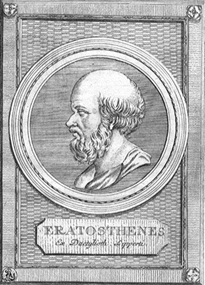Eratosthenes of Cyrene
Eratosthenes
Eratosthenes of Cyrene (b. c. 276 BC, Cyrene – d. 194) was an ancient Greek scientist. He received education in Alexandria and Athens. In 240, he headed the Library of Alexandria. He was interested in philology (he was the first to use this word instead of grammar), studied ancient Greek comedy, poetics, and philosophy. Eratosthenes also studied chronology, mathematics, astronomy, and geography; He is considered the founder of scientific geodesy, and cartography; He was the first to measure the length of the Earth's meridian, defined mathematical and geographical basics, developed a method for finding prime numbers (the sieve of Eratosthenes), and introduced the term equator. His works on ancient comedy (12 volumes), chronographic tables (9 volumes), and geography (3 volumes) are well-known. Only excerpts from his works quoted in the works of later authors have been preserved.
For the history of Georgia is especially valuable Eratosthenes' knowledge about the geographical and ethnographic situation of the Black Sea coast and the Caucasus, cited in Strabo's work, — local cities, rivers (Phasis – present day Rioni river), mountains, as well as Kartvelian and their neighboring tribes are named: Moschi, Tibareni, Colchians, Albanians, etc.
Literature: ყაუხჩიშვილი თ., სტრაბონის გეოგრაფია. ცნობები საქართველოს შესახებ, თბ., 1957; B e r g e r A., Die geographische Fragmente des Eratosthenes, Lpz., 1964.
N. Lomouri


